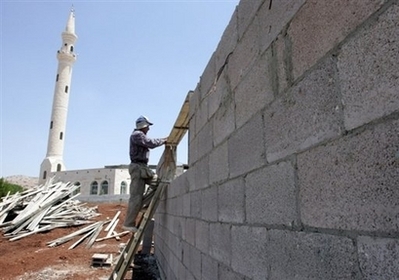Palestinians live in horror of losing their homes
by Patrick Moser
Wed May 28,

A Palestinian man works at a construction site in the village of Aqaba
in the northern West Bank. Israeli demolition orders are currently
targeting more than 70 per cent of Aqaba's structures, involving 28
Palestinian family houses and several public buildings such as the
kindergarten, the school and the local clinic.
(AFP/Jack Guez)
AL-AQABA, West Bank (AFP)
Salim Hamed Jaber, 85, shook his head angrily as he recounted how an Israeli soldier drove up to his impoverished household in the occupied West Bank to deliver a demolition order. "Living under the occupation is like having a piece of glass in your throat," said Jaber.
According to the UN Office for Coordination of Humanitarian Affairs (OCHA), "more than 3,000 Palestinian-owned structures in the West Bank have pending demolition orders, which can be immediately executed without prior warning".
Most of the orders were issued because there were no construction permits, which Israeli authorities only seldom grant to Palestinians, the UN agency said, adding that in some cases entire communities could be displaced.
"This is occupation, this is injustice," said Jaber. And he cannot understand why anyone would want to demolish his home -- a four-room brick and corrugated iron shack in the dusty, sun-baked village of Al-Aqaba. Villagers say Israeli troops have told them they need the area for military training, because the landscape resembles southern Lebanon, where Israel fought a 34-day war against the Shiite Hezbollah militant group in 2006.
Al-Aqaba, population 300, is one of several West Bank communities that could be wiped off the map if the demolition orders are carried out.Villagers and UN officials say 35 of the 45 structures in town are under demolition orders, including the kindergarten, the school and the clinic -- which were all built with foreign aid -- as well as the mosque.
Foreign donors, which include Britain, Belgium, Germany, Japan, Norway and the United States, have become key allies in the village's battle to survive. UN officials say the small village received a total of 819,000 dollars in international aid since 1999. "Some donors say that if the demolition goes ahead, they would rebuild," said Mayor Sami Sadr. His office is a bench set in the shade of a carob tree. A sign proclaims: "Village Council. Welcome to Al-Aqaba."
"Donors see that the people of Al-Aqaba have the right to be here," said the mayor.
Having lost an appeal to the Israeli High Court, Sadr now plans to travel to Washington next month to take his case to the US Congress.
At least nine more communities throughout the West Bank are also at risk of being almost entirely displaced because of demolition orders, OCHA said in a report published on Tuesday.
The threatened buildings are located in so-called Area C, which makes up more than 60 percent of the West Bank, is home to 70,000 of the 2.3 million West Bank Palestinians and is under full Israeli control.
More than 94 percent of applications for building permits in Area C submitted by Palestinians between January 2000 and September 2007 were denied, according to official data.
"The denial of permits for Palestinians on such a large scale raises the fear that there is a specific policy by the authorities to encourage a 'silent transfer' of the Palestinian population from Area C," the Israeli Peace Now human rights group said in a recent report.
In the first quarter of 2008, Israeli authorities demolished 124 structures as compared with 107 for the whole of 2007, leading to the displacement of 435 Palestinians, 135 of them children, OCHA said.
"Children are frequently disproportionately affected by the demolition of their homes and the subsequent displacement of their families," the study said.
At the small aid-financed kindergarten in Al-Aqaba, the sound of children's laughter fills the air. But even the little ones worry, said Sadr. "They ask their teacher: 'When are they coming to demolish our homes?'"
The 58-year-old mayor said he was severely wounded by bullets fired during an Israeli military exercise when he was working in his family fields at the age of 16.
He has been wheelchair-bound ever since, but said he is determined he and his village will stay. "We will continue building. We have no alternative. It is our land."